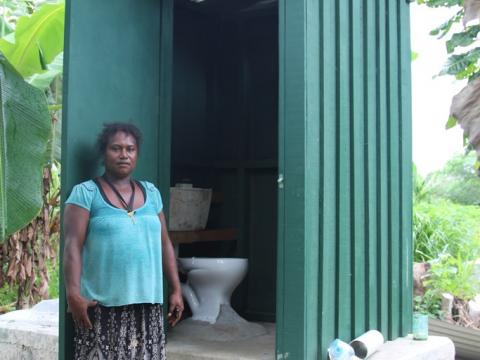Toilets: More than ‘luxury’ for Solomon Islands Flood affected Communities

For Solomon Islands women and their families, toilets are more than just a ‘luxury’, following flash flooding that damaged many communities. Toilets and education around sanitation, for flood survivors in Honiara and Guadalcanal Plains, mean healthier communities, and women feel less vulnerable.
Ngalimera resident, Jenny Falua, 18 said having toilet facilities closer to home is better for security reasons, especially at night and during rainy weather.
“The project taught us to regard hygiene as an important aspect of a healthy and happy community where women and children enjoy good health,” said Jenny.
The Ngalimera community, with a population of 560, has 7 toilets, built by World Vision with assistance from the people of Ngalimera and funding from UNICEF.
“It has triggered new hope for us. We were able to come together as a community and work hand in hand to ensure we have proper toilet facilities. Through health awareness talks we ensured that we live in a good clean and healthy environment,” said Jenny.
More than 5,000 people in 17 communities of Malango, Ghaobata and Tandai wards in Guadalcanal Plains are benefiting from the UNICEF-funded project. The project includes toilets for all communities and additional rain catchment tanks for eight communities.
Ruth Pilapaso, 32, is another woman who benefited from the Water, Sanitation and Hygiene (WASH) project implemented by World Vision as part of its rehabilitation response to survivors of the April flash flood in the capital, Honiara and Guadalcanal Plains.
“People here no longer have to carry spades and digging tools to the bush to dig holes every time they feel like relieving themselves,” says Ruth Pilapaso as she opened the door of her new toilet block 50 metres away from her house. “With the new toilet facilities around here, it will help us change the way we live as we will no longer go to the bushes.”
The latrines are designed as a dry pit covered with a concrete slab with open defecating holes enclosed in a roof and timber structure. However there are some families like Ruth’s family who took the initiative to install flushed toilets on the slabs at their own cost because water is sufficiently available in her community.
“Immediately following the floods, disease outbreak and sanitary issues was a major concern for the community,” said Ruth. “We were very fearful about the impacts of these outbreaks for our children in the long run. But we are relieved now that the project is here to ensure that we are protected.”
World Vision also promotes good hygiene practices in the communities through a series of trainings and awareness talks in the community as well as encouraging them to maintain sanitary conditions and sustain the use of the facility.
World Vision’s WaSH project is supported by various donors, across the sectors to enable the overall response to occur. Partnerships with donors such as the European Union, UNICEF and the Australian Government Department of Foreign Affairs and Trade (DFAT) have made World Vision's water & sanitation and hygiene projects happen.